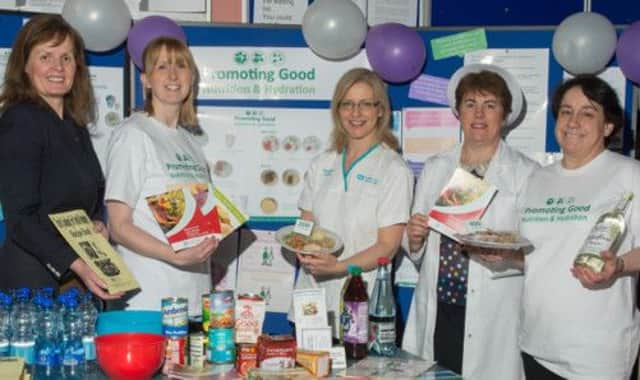Northern Trust promote good nutrition and hydration


In response to a recent regional Department of Health, Social Services and Public Safety (DHSSPS) document, “Promoting Good Nutrition” as well as promoting ‘Good Nutrition and Hydration Day’ on the 20 March 2013, the Northern Trust has launched two new posters entitled ‘Promoting Good Nutrition’ and ‘High Five - Calorie Foods’. The purpose of these posters is to raise awareness and promote high calorie provision for patients who are at risk of under-nutrition in hospital.
As part of this work, the Trust has also launched a new patient information leaflet entitled “Learn about Small Appetites and under-nutrition”. This innovative work on Nutrition has been led by the Trust Nursing Governance and Patient Experience Department. The patient information leaflet has been developed by two of the Trust’s Open University Nursing Students Melissa Lagan and Maria Diven.
Advertisement
Hide AdAdvertisement
Hide AdThe launch of these new posters and patient information literature was accompanied by interactive road-shows in three of the Trust’s hospitals – Antrim Area, Causeway and Holywell. The interactive road-shows were planned to raise awareness of the importance of nutrition and hydration with nursing, medical staff, domestic services staff, as well as patients and visitors to the hospitals. The catering departments provided food to illustrate portion size examples and the calorie content of each meal was highlighted. A variety of food portions each containing 100 calories was also used to raise awareness of the importance and value of small, frequent snacks for patients.
There were also jugs and bottles of water to show how much fluids adults should drink every day. The amount of fluid we need varies from person to person. Generally speaking, we should aim to drink one and a half to two litres of fluids a day. This includes water and other drinks like squash, fruit juices, tea and coffee. Some of our fluid requirement also comes from the food we eat, such as soup, milky puddings, ice-cream and fruit with high juice content.
Additional nutritional work is being carried out in one pilot ward in Causeway Hospital with a Volunteer Mealtime Companions Project. This project has been developed by the Northern Trust in partnership with Age Concern, Causeway. The volunteers offer companionship and extra support to patients during mealtimes while they are in hospital. This project aims to enhance the mealtime experience for patients in one ward Causeway hospital.
Joanne Deery, Dietetic Team Lead commented, “Good nutrition is the cornerstone to patient care and recovery. It is essential that patients receive nutritious meals, as well as small frequent nourishing snacks, and given assistance by nursing staff where needed”.
Advertisement
Hide AdAdvertisement
Hide AdGood nutritional and hydration requires a multidisciplinary approach to patient care. The development of the two new information posters in the Trust “Promoting Good Nutrition” and “High Five-Calorie Foods” as well as the Patient Information leaflet involved a multidisciplinary approach. It is hoped this new innovative work will help to raise staff and patient awareness on under- nutrition and assist in a meaningful positive contribution to patient care.